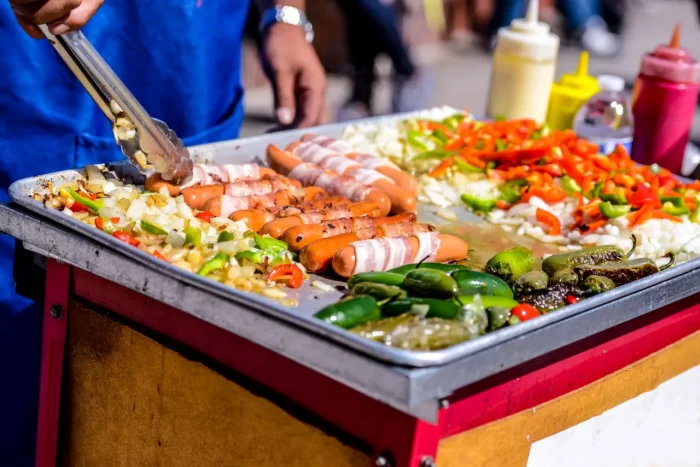Los Angeles County recently passed a new ordinance that streamlines the permitting process for street food vendors and home cooks. The Microenterprise Home Kitchen Operations (MEHKO) ordinance, passed unanimously by the L.A. County Board of Supervisors, goes into effect in November. In this article we talk about How L.A County New Ordinance Could boost Street food vendors.
This new ordinance makes it easier for the over 50,000 sidewalk vendors and home cooks in L.A. County to obtain permits to “make safe and regulated food for the public,” according to a county news release. In addition, the nearly $600 permit application fee will be waived for the first 1,000 eligible MEHKO applicants.
Huge Potential for Underrepresented Groups
According to County Supervisor Holly J. Mitchell, who introduced the motion last year, sidewalk vendors and home cooks “are part of the cultural and culinary fabric of our neighborhoods.” They are often the primary source of affordable, quality food in many neighborhoods. The ordinance also provides an opportunity for families to earn a steady income.
A statewide survey by the nonprofit COOK Alliance found that 84% of sidewalk vendors and home cooks in California’s “informal economy” are women. In addition, 48% identify as Black, Latinx, or multiracial.
“MEHKOs represent an important economic vehicle for entrepreneurial County residents – especially women, immigrants, and communities of color – to create new opportunities in the formal economy,” said Supervisor Hilda L. Solis.
In other words, the ordinance levels the playing field and makes it possible for historically underrepresented groups to legally participate in the food industry. This can provide a significant financial boost to immigrant and minority communities in L.A. County.
Benefits to Residents and Businesses
Advocates say MEHKOs benefit both residents and brick-and-mortar food establishments in L.A. County. For residents, easier permitting means more options for affordable, culturally diverse cuisine from home cooks and vendors in their own neighborhoods.
For existing food businesses, the ordinance creates fair competition by requiring home cooks and vendors to meet the same health, safety, and transparency standards. All MEHKO vendors must pass a health inspection and food safety certification course. Their kitchens, menus, and prices must also be transparent to consumers.
With these guardrails in place, MEHKOs can complement — rather than undermine — established restaurants and food trucks. Some brick-and-mortar eateries may even partner with home cooks on delivery or takeout.
Support for Undocumented Entrepreneurs
The ordinance is especially meaningful for L.A. County’s undocumented immigrant community. Without access to driver’s licenses, loans, or business licenses, undocumented residents face major obstacles to owning and operating food establishments legally.
MEHKOs eliminate some of these barriers. Permits are administered by the health department, not the state or county. This gives undocumented immigrants a way to legally prepare and sell food from home kitchens or sidewalk carts.
For many, it means no longer having to operate “underground” or risk fines for lacking permits. It provides an avenue into the formal economy.
Booming Street Vendor Scene
California has a long, rich history of street food vendors. But Los Angeles County has witnessed an explosion in recent years — becoming a street food mecca on par with cities like Portland, New York, and Austin.
The pandemic fueled L.A.’s sidewalk food scene even further. With more people staying in their neighborhoods, street carts and trucks offered a safe outdoor dining option. Home cooks with more time on their hands took up food vending to replace lost income.
By making permits more accessible, L.A. County’s ordinance ensures this booming scene continues legally and safely. It empowers more Angelenos to showcase their cultural cuisine and earn income through food vending.
What MEHKOs Allow Vendors to Sell
The MEHKO ordinance allows home cooks to prepare “non-potentially hazardous foods” from home kitchens. This includes baked goods, jam, popcorn, coffee, and many traditional cultural foods. They can then sell items directly to consumers from home or at community events.
Sidewalk cart and truck vendors can prepare the same items. They can also cook certain hot foods to order if they pass additional safety requirements.
Foods still prohibited for MEHKO vendors include raw meat, fish, and shellfish. Home kitchens and carts lack capacity to store and cook them safely. These limitations protect public health while opening doors for vendors to legally operate.
Steps to Getting an MEHKO Permit
Here are the basic steps L.A. home cooks and vendors must complete to get approved for an MEHKO permit:
- Complete a food safety certification course
- Pass a health inspection
- Label all foods with name, address, ingredients, allergens, etc.
- Submit required documents (application, commissary agreement, etc.)
- Pay fee (waived for first 1,000 vendors)
Once approved, permits must be renewed annually. Vendors must also continue meeting safety, transparency, and labeling requirements.
With far fewer barriers than business licenses or commercial kitchens, MEHKO makes formal vending possible for thousands more L.A. entrepreneurs. This empowers immigrant, minority, and underserved communities to share cultural food and earn income legally.
The New Norm for Street Food Cities
Many major U.S. cities have already passed similar policies, including San Diego, San Francisco, Oakland, and Sacramento. These ordinances formalize and legitimize street vending while opening economic opportunities.
With the passage of MEHKO, Los Angeles County joins the new norm for street food-loving metropolitan regions. The ordinance cements L.A.’s status as a hub for diverse, authentic mobile cuisine.
Most importantly, it brings financial stability and dignity to the vendors who have long fed the city’s neighborhoods, often while living in poverty or fear of deportation. MEHKOs offer a formal voice to these informal food heroes.
The Taste of L.A. to Come
From Oaxacan moles to Salvadoran pupusas, Brazilian cheese bread to Chinese dumplings, L.A. County’s incredible range of cultural food will soon emerge from more home kitchens. Hungry Angelenos can expect more of these previously “underground” foods sold legally at neighborhood street carts.
While health and safety standards remain paramount, the ordinance grants home cooks creativity in the foods they sell. By giving more cooks a pathway to formal vending, MEHKO promises to make L.A. streets an even greater global food destination.
The diverse cuisine sold legally by MEHKO vendors will reflect the cultural fabric of L.A. better than ever. These microenterprise food operations will help write the next chapter in the region’s rich culinary history. I sincerely hope you find this “How L.A County New Ordinance Could boost Street food vendors? Find Out Here” article helpful.

